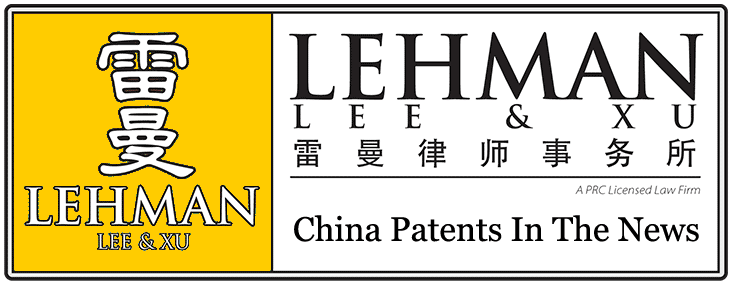
September 28 , 2011
 |
|
LEHMAN, LEE & XU
|
|
China Patents In The News
|
|
September 28 , 2011 |
|
|
|
In the News |
Chinese Patent registrations target: 2 million patent registrations by 2015 |
|
Updated: 2011-09-09 11:12 China has set a target of 2 million patent registrations by 2015, but "the innovation-by-numbers approach has led to a race for quantity rather than an improvement of the quality of inventions", Cucino said. |
SIPO: Worldwide patent data crucial to China's innovation |
|
Updated: 2011-09-14 15:58 Companies need to recognize the importance of patent documents as part of their development strategy and use those resources throughout the entire innovation process, Tian Lipu, commissioner of the State Intellectual Property Office (SIPO), said at an annual meeting on patent information in Beijing last week.
|
100 PCT application filings light the way for LED makers |
Updated: 2011-08-31 10:35 While the prospect of selling their products abroad seems dim to many domestic LED makers that lack patented core technologies, Fujian Wanbang Optoelectronic Technology Co Ltd could have a bright future due to "new breakthroughs" in chip-related research. |
China Law News |
CONTENTS
Rule stiffens penalties for hackersBEIJING - Hackers who broke into 20 or more computers will face jail terms of up to seven years, according to a new judicial interpretation issued jointly by the China's Supreme People's Court and Supreme People's Procuratorate. People who hack from 20 to 100 computers, or steal from 10 to 50 user names and passwords for online-payment or stock accounts, will get at least three years in prison. And those who hack even more computers or steal more passwords will face jail terms of up to seven years. The latest rule, an interpretation made to deal with online crimes, which were added to the Criminal Law in 2009, also applies to Chinese hackers who steal information from foreign computers, said Zhou Guangquan, a member of the National People's Congress's law committee and a professor in criminal law at Tsinghua University. Continue reading at: http://usa.chinadaily.com.cn/china/2011-08/30/content_13216410.htm A black eye for Bay StreetAt a recent dinner in Toronto honouring Canadian corporate directors, Spencer Lanthier, a former member of the Bank of Canada’s board, told the crowd, “This city, this province, this country has a reputation of being the best location to carry out white-collar crime—corporate fraud—in the industrialized world.” As if to underline Lanthier’s words, the Ontario Securities Commission last week made headlines with its allegations of malfeasance against Sino-Forest Corp., and an accompanying cease-trade order. |
|
|
|
|